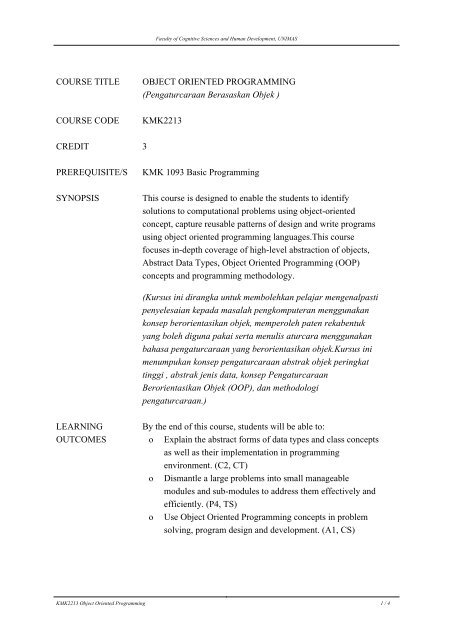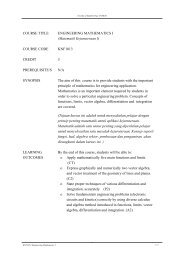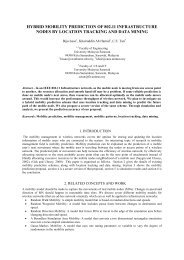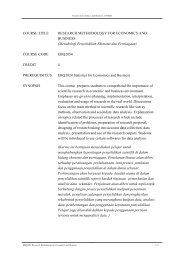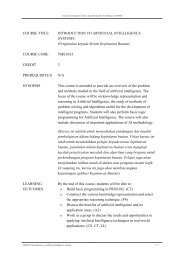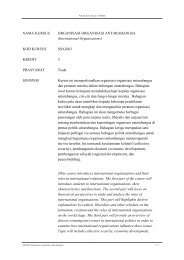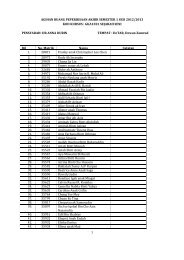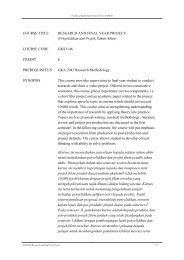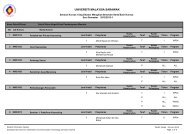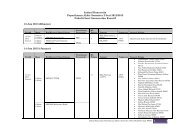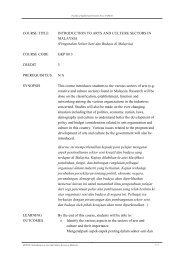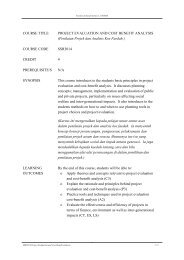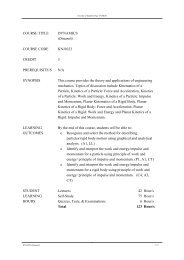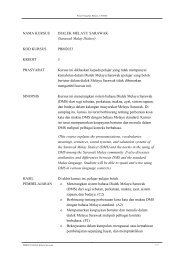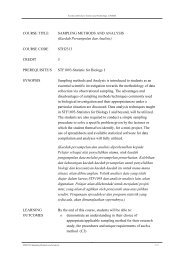COURSE TITLE OBJECT ORIENTED PROGRAMMING ...
COURSE TITLE OBJECT ORIENTED PROGRAMMING ...
COURSE TITLE OBJECT ORIENTED PROGRAMMING ...
Create successful ePaper yourself
Turn your PDF publications into a flip-book with our unique Google optimized e-Paper software.
Faculty of Cognitive Sciences and Human Development, UNIMAS<br />
<strong>COURSE</strong> <strong>TITLE</strong><br />
<strong>COURSE</strong> CODE<br />
<strong>OBJECT</strong> <strong>ORIENTED</strong> <strong>PROGRAMMING</strong><br />
(Pengaturcaraan Berasaskan Objek )<br />
KMK2213<br />
CREDIT 3<br />
PREREQUISITE/S<br />
SYNOPSIS<br />
KMK 1093 Basic Programming<br />
This course is designed to enable the students to identify<br />
solutions to computational problems using object-oriented<br />
concept, capture reusable patterns of design and write programs<br />
using object oriented programming languages.This course<br />
focuses in-depth coverage of high-level abstraction of objects,<br />
Abstract Data Types, Object Oriented Programming (OOP)<br />
concepts and programming methodology.<br />
(Kursus ini dirangka untuk membolehkan pelajar mengenalpasti<br />
penyelesaian kepada masalah pengkomputeran menggunakan<br />
konsep berorientasikan objek, memperoleh paten rekabentuk<br />
yang boleh diguna pakai serta menulis aturcara menggunakan<br />
bahasa pengaturcaraan yang berorientasikan objek.Kursus ini<br />
menumpukan konsep pengaturcaraan abstrak objek peringkat<br />
tinggi , abstrak jenis data, konsep Pengaturcaraan<br />
Berorientasikan Objek (OOP), dan methodologi<br />
pengaturcaraan.)<br />
LEARNING<br />
OUTCOMES<br />
By the end of this course, students will be able to:<br />
o Explain the abstract forms of data types and class concepts<br />
as well as their implementation in programming<br />
environment. (C2, CT)<br />
o Dismantle a large problems into small manageable<br />
modules and sub-modules to address them effectively and<br />
efficiently. (P4, TS)<br />
o Use Object Oriented Programming concepts in problem<br />
solving, program design and development. (A1, CS)<br />
KMK2213 Object Oriented Programming 1 / 4
Faculty of Cognitive Sciences and Human Development, UNIMAS<br />
STUDENT<br />
LEARNING<br />
HOURS<br />
Lectures<br />
Tutorials<br />
Laboratories/Practical<br />
Student-Centered Learning<br />
Self-Study<br />
Quizzes, Tests, & Examinations<br />
Total<br />
24 Hour/s<br />
4 Hour/s<br />
8 Hour/s<br />
6 Hour/s<br />
72 Hour/s<br />
6 Hour/s<br />
120 Hour/s<br />
LEARNING<br />
UNITS<br />
Supervised<br />
Learning Hours<br />
1. Overview of Object Oriented Programming and C++<br />
- Programming Universal<br />
- Procedural Programming<br />
- Object-Oriented Programming<br />
3<br />
2. Concepts of Data Abstraction<br />
- Introduction to Problem Solving and Data<br />
Abstraction Design<br />
- Abstract Datatype Concepts<br />
- Encapsulating Class Components<br />
- Implementing Functions in a Class<br />
- Using Private Functions and Public Data<br />
- Considering Scope when Defining Member<br />
Functions<br />
- Understanding Polymorphism<br />
6<br />
3. Class Features and Design Issues<br />
- Classifying the Roles of Member Functions<br />
- Understanding Constructors<br />
- Writing Constructors without Parameters<br />
- Writing constructors with Parameters<br />
- Overloading Constructors<br />
- Using Destructors<br />
6<br />
4. Overloading Operators<br />
- Understanding the Benefits of Overloading and<br />
Polymorphism<br />
- Overloading Operators General Rules<br />
- Overloading and Arithmetic Operator<br />
6<br />
5. Inheritance<br />
7<br />
KMK2213 Object Oriented Programming 2 / 4
Faculty of Cognitive Sciences and Human Development, UNIMAS<br />
- Creating a Derived Class<br />
- Inheritance Restrictions<br />
- Class Access Specifier<br />
- Overriding Inherited Access<br />
- Overriding and Overloading Parent Class Functions<br />
6. Templates<br />
- The Use of Function Templates<br />
- Using Multiple Parameters in Function Templates<br />
- Overloading Function Templates<br />
7<br />
7. Handling Exceptions<br />
- Limitations of Traditional Error Handlings Methods<br />
- Throwing Exceptions<br />
- Using Try Blocks<br />
- Catching Exceptions<br />
- Default Exception Handler<br />
7<br />
ASSESSMENT Group Assignment 1<br />
10 %<br />
Group Assignment 2<br />
15 %<br />
Individual Assignment<br />
15 %<br />
Quiz<br />
10 %<br />
Mid-Term Examination<br />
20 %<br />
Final Examination<br />
30 %<br />
Total<br />
100 %<br />
REFERENCES 1. Carrano, F. M. (2007). Data abstraction and problem<br />
solving with C++ walls and mirrors (5th ed.). Boston:<br />
Addison Wesley.<br />
2. Drozdek, A. (2005). Data structures and algorithms in<br />
C++. Boston: Course Technology.<br />
3. Farrell, J. (2009).Object-oriented programming using C++<br />
(4th ed.). Canada: Course Technology.<br />
4. Lorenz, M. (1993). Object-oriented software development:<br />
A practical guide. New Jersey: PTR Prentice Hall.<br />
5. Weisfeld, M. (2008). The Object-oriented thought process<br />
(3rd ed.). New Jersey: Addison-Wesley Professional.<br />
KMK2213 Object Oriented Programming 3 / 4
Faculty of Cognitive Sciences and Human Development, UNIMAS<br />
Last updated: May 3, 2011, Tue, 4:43 PM<br />
KMK2213 Object Oriented Programming 4 / 4


